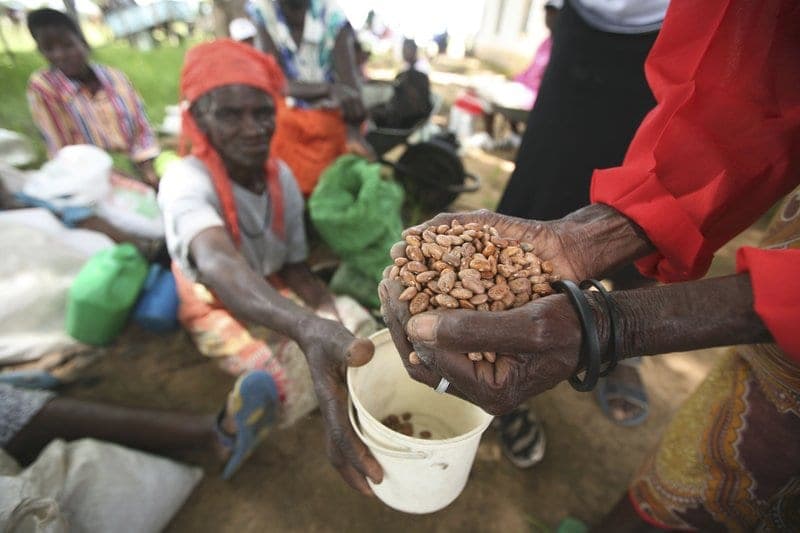ROME – Quoting both Pope Francis and his predecessor, Benedict XVI, the Vatican’s point man on human development defined hunger as “criminal” and access to food as an “an inalienable right” during an online seminar Monday.
“Food insecurity is not simply a lack of food,” said Cardinal Peter Turkson, head of the Vatican’s Dicastery for Integral Human Development.
The crisis of food insecurity is a complex and multifaceted issues, he said, arguing that the challenges could be framed through a series of questions: “How can hunger be overcome? How can safe, affordable, nutritious and sustainable food be ensured? How can farm workers, small farmers around the world, live and work with dignity? How can rural communities, especially women, survive and thrive? How can land, water and other elements of God’s creation be preserved, protected and used well in the service of the common good? And how do we respond to climate change in this regard?”
Turkson argued food systems in the post COVID-19 world needing to be more robust, resilient and sustainable.
“Re-imagining and regenerating such robust food systems in the post COVID-19 world require a holistic approach, in the sense of which integral ecology is presented in Laudato Si’,” he said, referring to Pope Francis’s 2015 document dedicated to the environment.
According to the United Nation’s World Food Program, 957 million people across 93 countries don’t have enough to eat, and 2019 to 2020 was the first time in decades that the number went up from year-to-year.
The Vatican’s Food For All webinars were organized with the hope of influencing the upcoming UN Food Systems Pre-Summit that will be held in Rome this July, which in turn is the preparation for the one being held in New York in September.
RELATED: Fight against hunger is both human and divine, Vatican webinars insist
The series stems from the collaboration of the Secretariat of State, the Holy See’s permanent mission to the Rome-based UN food agencies (FAO, IFAD and WFP), the Dicastery for promoting Integral Human Development, and the Vatican’s COVID-19 commission.
The seminar was moderated by layman Mateo Bruni, who heads the Vatican’s press office.
“This crisis is an even more compelling cause to recognize how food is central to human integral development and also how we can develop healthy food systems by putting the human person at the center,” Bruni said.
Also speaking on Monday was Italian Cardinal Pietro Parolin, the Vatican’s Secretary of State, though with an audible sore throat, he asked Francesca di Giovani, who serves as the Undersecretary for Multilateral Affairs in the Section for Relations with States, to read his prepared remarks.
“We need concrete and incisive actions: This time represents an occasion of recovery for all,” Parolin said, arguing that a new vision, based on “integral ecology” is needed in order to address the conflicts, the economic shock and extreme natural events that affect a “desolating” number of people.
Seeing the statistics that were shared through out the three sessions, the cardinal argued, “we cannot remain indifferent” because behind the numbers “there are people.”
“Good intentions are of little use. To guarantee peace and development, understood as the improvement of the living conditions of populations suffering from hunger, war and poverty, concrete actions are necessary,” the cardinal addedl
The COVID-19 crisis, he said, brought to light a series of other crises related to health, food and environment, and this is a “historic” opportunity for a new beginning “that we cannot afford to miss.”
The prelate then gave three “orientation points” on what can be done, starting with adopting a worldview that is based on the central concept of Laudato Si’ — integral ecology — which he described as a “complex and multidimensional concept that takes a long-term view.”
Integral ecology, Parolin said, revolves around two key concepts: The centrality of the human person and the need to promote the culture of care, which is the privileged way to protect the human and natural environment and to build peace.
The second point is respect for human dignity, calling for concrete measures to end hunger and malnutrition and the right of every person to be “free from poverty and hunger.”
“In today’s world, with enough food for everyone but not everyone having access to it, it is not a question of demographics, but of distribution and access,” Parolin said. “It is therefore an invitation to rethink our food system, not only in a resilient, sustainable and inclusive perspective, but also in solidarity, overcoming the logic of the savage exploitation of [God’s] creation.”
Lastly, he called for a “priority role” of the agricultural sector, with small farmers and family-ran farms being at the center of the system and the decisions made around food security, instead of remaining invisible nods in the chain.
Presented both as a fourth orientation point and as a summary of them all, Parolin urged the decision makers to take a leap, go from a culture of waste to a culture of care.
Turkson said the peace of the world depends on how we deal with hunger in the world.
“The elimination of world hunger has become an element for safeguarding the peace and stability of this planet. When we live as one human family, there will be food for all,” he said.
Follow Inés San Martín on Twitter: @inesanma














